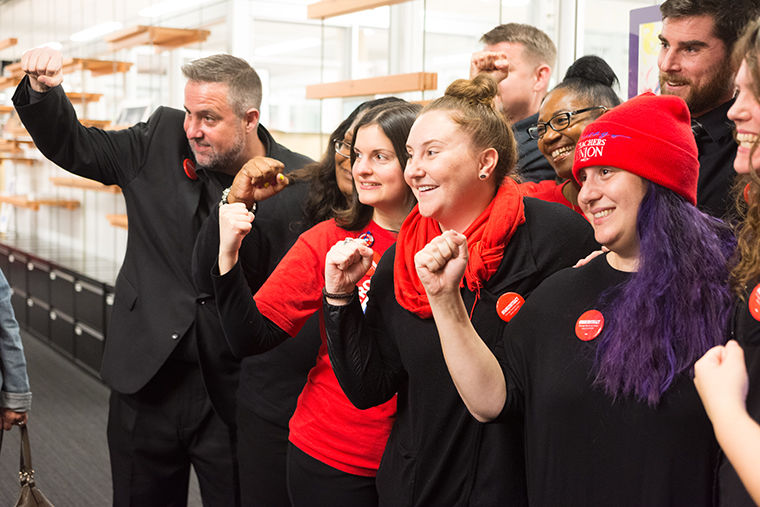Chicago Teachers Union helps start possible first US charter school strike
Chicago Acero schools union members voted 98 percent in favor of striking Oct. 30, which may be the first charter school strike in national history.
November 5, 2018
For the first time in charter schools’ 26-year history, a handful of South Side Chicago charter schools’ teachers may hold the first-ever U.S. strike, union leaders said.
Acero district school union members voted Oct. 30, with 98 percent of the 503 respondents voting in favor of striking. Acero is represented by the Chicago Teachers Union, which also represents Chicago International Charter School which voted whether or not to strike Nov. 2.
Acero union members returned to the bargaining table in the days following to try again for a contract agreement before setting a possible strike date, according to an Oct. 30 CTU press release.
According to CTU Communications Director Chris Geovanis, the teachers are seeking increased pay, smaller class sizes, sanctuary policies for the Latino student population and increased classroom resources for students with disabilities.
“The bureaucracy in Chicago Public Schools and the unions both benefit from the system that provides billions of dollars a year to them to run the schools,” said Liv Finne, education director of the Center for Education at Washington Policy Center—a think tank in Seattle. “Charter schools represent a counter vision for public education where parents get to choose the school and teachers are allowed to innovate.”
Jurema Goraam, an administrator at Baker College Prep, a charter school on the South Side not involved in the strike, said unions can help teachers organize and have their voices heard, but the situation could elevate their platform and lead to dissolution of charter schools in Chicago altogether.
“We are very disappointed that [union members] would vote to authorize a strike. It is unfair to parents and students to threaten to disrupt classes when Acero Schools are more than willing to continue negotiations and work with the federal mediator brought in this weekend,” reads an Oct. 30 statement from Acero. “Regardless, we will continue to negotiate in good faith. We are committed to reaching an agreement that provides a reasonable and competitive compensation package for our teachers and staff while maintaining the best possible educational outcomes for our students.”
Geovanis said some Chicago charter school teachers are disrespected and do not enjoy the same job opportunities or classroom resources compared to charter schools in more affluent Chicago neighborhoods.
Goraam said she hopes the strike will bring more transparency, opportunities and advocacy for teachers, regardless of union membership.
“The big issue is that charters don’t make as much as CPS, and, on top of it, there is a lot more demand as a teacher in a charter school, yet you have less [people] to advocate for you,” Goraam said.
Charter schools lack support and transparency for teachers, and have been purging workers of color despite the majority black and Latino student population, Geovanis said.
Some charter school teachers and parents do not support the strike because teachers will be unpaid, and it will disrupt the learning environment for students, she added.
The difference between public school and charter school strikes lies with the parents, Finne said. At public schools, parents have no choice but to leave their children in school while teachers strike, but at charter schools, parents can pull their kids and enroll them in a non-striking school, which Finne says could affect what happens at the bargaining table behind closed doors.
Geovanis said the union is deeply committed to working with parents during this time to build support and open communication between them and the unionized teachers.
Although Goraam said charters do have their flaws, they have continued to grow and evolve over time, and this strike may help to speed up the process by giving teachers a way to advocate for themselves.
“In most cases, because charters are independently run, you really don’t have those checks and balances,” Goraam said. “If you don’t think something is working well, you don’t have a voice [to change that].”








